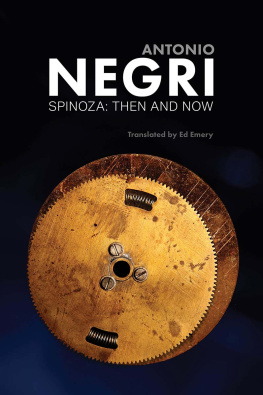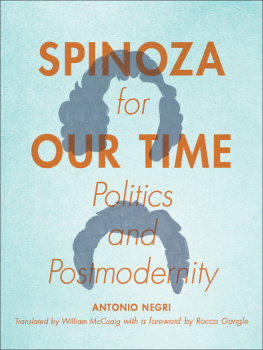The contents of this book are based upon a filmed conversation between Howard Burton and Hasana Sharp in Montral, Canada, on August 20, 2015.
Introduction
Philosophical Relevance
I often wonder what Socrates would say if he were to suddenly find himself resurrected in our modern world. In particular, I imagine his profound confusion at being confronted with a society that near-universally regards philosophy as some abstruse academic activity that is generally regarded as removed from the pressures of everyday life as could be envisioned.
For Socrates, of course, philosophy represented nothing less than the acme of relevance, the lifeblood of any active, thinking communityso much so that he was prepared to die if he was denied the opportunity to consistently prod and pester the Athenian youth to reflect upon how they should best live their lives and explicitly confront their understanding, or lack thereof, of the values they operated under.
So when Hasana Sharp, Associate Professor of Philosophy at McGill University, told me that she was contemplating writing a self-help book based upon Spinozas philosophy I didnt find it a particularly odd notion. But most people these days, I appreciate, probably would have.
Spinoza is a fascinating character, and in recent decadeslargely thanks to the efforts of Jonathan Israel and his thesis of the so-called Radical Enlightenmentis enjoying a particularly strong renaissance in academic philosophy, at least in the English-speaking world, where he has long been considerably less appreciated than in other philosophical traditions. But Hasana is not particularly preoccupied with Spinozas metaphysics or his role in the promotion of rationalist inquiry, her interest lay in a much more personal direction, initially piqued by the prospect of how a careful reading of Spinozas ideas could help us understand why various modern social movements around us had failed.
It was actually my college English teacher, Warren Montag, who introduced me to Spinoza. Hes widely known for his scholarship, especially of the French philosopher Louis Althusser, but also for Spinoza. He presented Spinoza as someone to whom many thinkersprimarily Marxistswere turning to ask the question of why people fight for their servitude as if it were salvation. I felt that, somehow, Spinoza was going to be the key to answering this question of how it is that people become invested in their own servitude and dont actually do what it is that will bring about their salvation or liberation.
And so it was that, as curious as it might seem at first glance, this 17th-century rationalist Dutch philosopher could become the inspiration for a self-proclaimed radical feminist and social activist with decidedly Marxist sympathies.
Montag introduced Spinoza through these Marxist anchors in France who were specifically excited about Spinoza after May of 68. At the time, in France, the students were really expecting there to be a big revolution, a major social transformation, but the movement seemed to collapse after 68.
Then the Marxist philosophers had somehow decided that the Hegelian optimism in Marx was not well-founded, and that Spinoza would help them think better about why these big efforts of transformation were failing, why it was so hard and why people seemed to be committed to live in a way that was to their disadvantage and not committed to emancipation or freedom.
Decades later, the radical young student has unsurprisingly evolved into a studied, reflective philosopher, but the quest for social understanding burns as strongly as ever. In her book Spinoza and the Politics of Renaturalization, Hasana puts forward her notion of philanthropic post-humanism, inspired directly by Spinozistic insights.
People say things like, What we need is unity, equality, mutuality of respectthat is the answer. And Im really convinced, through Spinoza but also especially through feminism, that this isnt the good answer. These have certainly contributed to social progress, but in general, theres no doctrine of humanism that doesnt also draw very clear lines around who counts as human and who doesnt.
They also always end up valuing certain characteristics of human beingslike reason, moral sensibility, the ability to make promises. And, of course, the cognitively disabled are excluded: it wouldnt include elderly or senile peopleand we can see how this subtly contributes to the way in which were not very good at taking care of our old, for example: we tend not to consider them productive, important members of society because they no longer exhibit these characteristics that we identify with humanity.
I think that a lot of problems follow from that; and I believe that, especially now that were encountering serious threats to the environment, this strong priority of humanity over all other beings is going to lead to all kinds of practical problems.
And I think Spinoza provides resources for thinking about alliances that are not based on some kind of unique, essential, human characteristic and systems of cooperation that are not grounded on regarding one another as special in kind or non-natural beings.
I call on him as a resource for philanthropic post-humanism because its post-humanism in the sense that its not a reinforcement or revitalization of early humanisms cause for equality and mutuality on the basis of equal dignity or equal rationality, so its post-humanism in that sense.
Spinoza still insists that we have a reason to be allied with one another, that the community of others who are like us will thrive and be most capable and be happiest insofar as we have good systems of cooperation among us, so our relationship with each other is really, really important.
And if the issues of social inequality, treatment of the elderly and the environment werent enough to convince you of the enormous relevance of Spinozas ideas to contemporary life, Hasana has one more for you, something even more personal still.
I think I got really hooked because Spinoza makes this distinction between joyful and sad passionsjoyful passions are ones that make you stronger and more capable and more powerful, while sad passions are ones that are diminishing and make you weaker.
But its important to pay attention to, for example, those friends that make you feel exhilarated in conversation, make you come up with new ideas that you didnt know you had and provoke happy thoughts, make you feel strong, capable and intelligent as opposed to making you feel dumb, weak or like you have to fix things about yourself.











